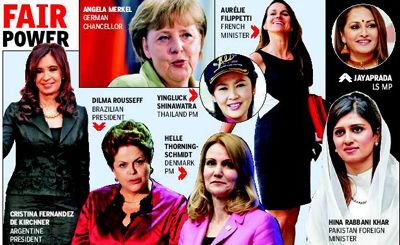
New Delhi, July 8: Here's one area where India is at variance with the global trend. While worldwide more women are calling the shots in parliaments and shaping laws, in India the growth in the number of women legislators has virtually been flat. Here are the numbers. Globally, there has been a 75% increase in the number of women parliamentarians in the seven-year period between 1995 and 2012. But India, where our male MPs have doggedly nixed all attempts to bring in women's reservation in Parliament, in a 11-year period between 1991 and 2012 their presence has gone up marginally from 9.7% to 10.96%.
According to the Millennium Development Goals Report 2012, released by the United Nations, while 11.3% of seats were held by women worldwide in 1995, the number had increased to 19.7% by 2012. Despite 15 general elections, the number in India is much lower.
As on November 2011, India, the world's largest democracy, has only 60 women representatives out of 544 members in Lok Sabha while there are 26 female MPs in the 241-member Rajya Sabha. According to data released by Inter parliamentary union (IPU), India ranks 98 in the world for proportion of parliament seats held by women.
UN's MDG Goals report adds that although the number of countries with women as head of government, head of state or both has more than doubled since 2005, in absolute terms the number - 17 - remains rather modest. The percentage of women ministers worldwide also improved only slightly, from 14.2% in 2005 to 16.7% in 2012.
Across the world, the most common ministerial portfolios held by women ministers have tended to be in social affairs, family and youth, women's affairs or education. According to the UN, the use of special measures or quotas were an important factor helping women to enter parliaments. Of the 59 countries that held elections in 2011 for lower or single houses, 26 had implemented special measures favouring women, and electoral quotas were used in 17. Where quotas were used, women took 27.4% of seats as opposed to 15.7% of seats in countries without any form of quota.
UN says "While trends point to an increase in women's parliamentary representation, the rate of representation remains low overall and progress is spread unevenly. The highest level is found in the Nordic countries, especially following recent gains in Denmark and Finland. Among developing regions, Latin America and the Caribbean continue to rank the highest, with a 23% average." Sub-Saharan Africa holds the second-highest regional ranking in women's representation in parliaments, 20%. Progress here was sustained thanks to the existence of quotas — mainly reserved seats. In Asia, women made gains in only one country — Thailand in the 2011 elections.
More than a third of the countries with 30% or more women MPs are in transition from conflict. Women are elected in greater numbers in systems of proportional representation than they are in majority electoral systems. The data collected on elections in 2011 indicates that women were not vying for seats in sufficient numbers to make a large electoral impact. But notably, once they run for office, they are elected at about the same rate as men.
Times View
The gender skew in Indian Parliament is something that needs to be corrected. Quite clearly, the figures here build a strong case for reservation for women in legislatures. Parties say that they don't put up more women as candidates because their 'winnability' is poor. This is a specious argument. First, if it were true, it actually makes the case for reservation stronger since that would ensure that their winnability is assured in at least one-third of the constituencies. Secondly, how does that account for the fact that even in the Rajya Sabha, where only MLAs and not the general public vote, women constitute only about 10%?





Comments
Add new comment